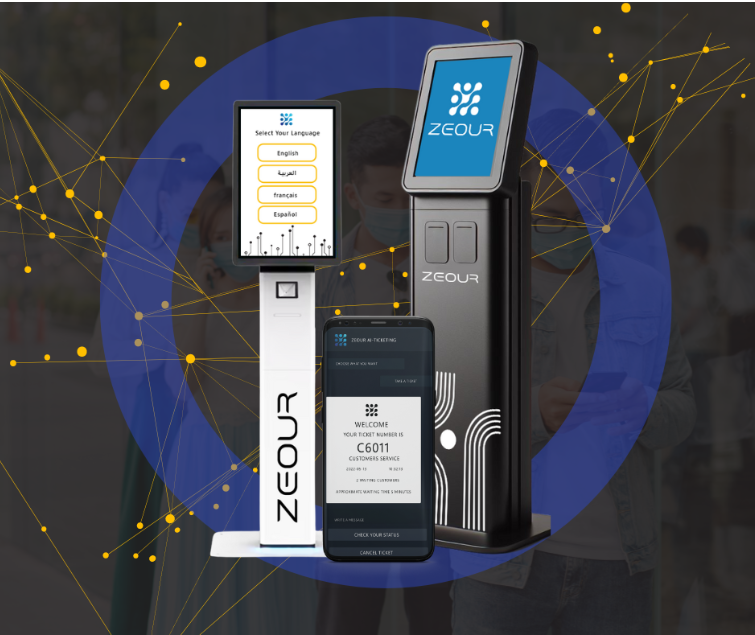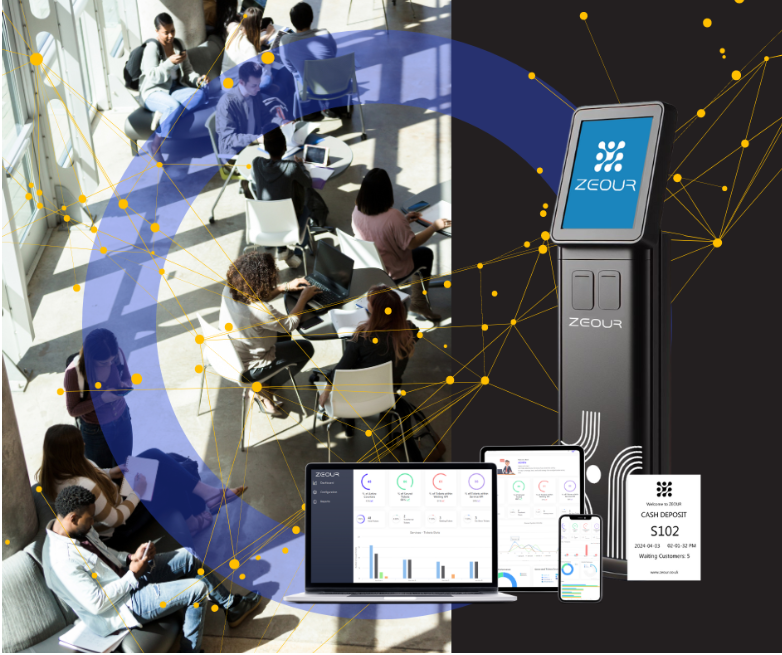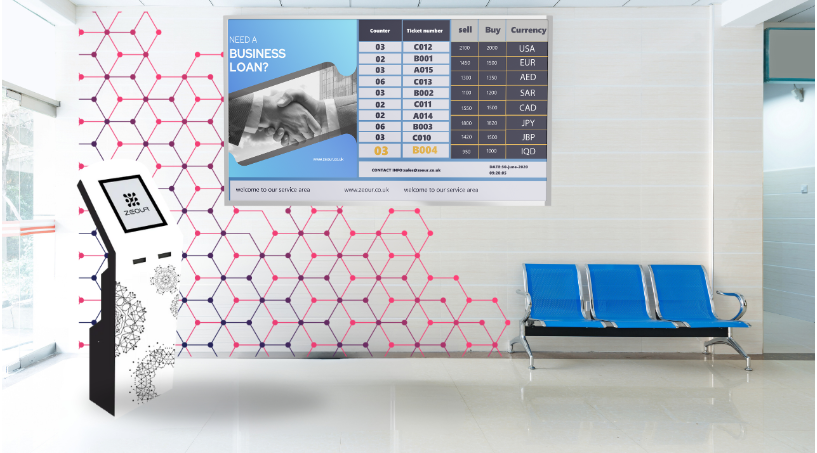The Implications Of Avoiding Queue Management Systems
The Implications Of Avoiding Queue Management Systems

Customer expectations for effective service have increased more than ever in this dynamic environment. Businesses that struggle to manage queues effectively are at risk of losing clients and ruining their reputations. Queue management systems are essential for managing customer flow and improving the overall customer experience. At Zeour, our queue management system focuses on increasing customer experience thus providing businesses with effective support.
Let's discuss the implications of avoiding queue management systems.
Challenges in Customer Experience:
Prolonged wait times and confusing instructions can have a major impact on the customer experience. Customers can get frustrated and nervous if they have no idea where to queue or how long the wait will be. Their sense of insecurity can lead them to feel like the business lacks regard for them, which could damage the brand's reputation. For instance, customers in a crowded bank might not understand which line to get in or how long they will have to wait if there is no queue management system in effect. Customers can get frustrated by this lack of clarity, especially when they observe that others, who may have arrived later, are receiving service before them.
In the above case, dissatisfied customers will be more likely to inform others about their bad experiences. Customer loyalty can decline and a business's reputation may be affected by unfavorable word of mouth and reviews. Poor experiences make customers less willing to come back, and they might even look for competitors who offer more efficient and more well-organized service areas.
On the other hand here is when a queue management system works miraculously. Customers can receive clear directions from a queue management system regarding where to go and how long to wait. A better and more satisfying customer experience can result in the ability to control expectations and relieve discomfort. Through the use of a queue management system, businesses may indicate that they respect the time of customers and are committed to delivering an effortless experience and effective service.

Inefficient Utilization of Resources:
Businesses that physically handle queues experience challenges in inefficient utilization of resources, especially during busy periods. Businesses frequently struggle with inadequate staffing or overstaffing in the absence of a queue management system, both of which can have adverse impacts.
Understaffing happens when there aren't enough employees to effectively handle the queues. Long wait times, frustrated customers, and decreased employee satisfaction could result from this. Understaffing could be interpreted by customers as a disrespect for their time, which could result in poor customer service as well as loss of business. Also, understaffing can cause unnecessary pressure on existing staff members, which can result in stress and reduced productivity.
On the contrary, overstaffing happens when there are more workers than needed to maintain the queues. Although this might seem beneficial in terms of shorter wait times, it might additionally lead to idle employees and higher operating expenses. Inefficiencies can also result from overstaffing since workers may not be fully used and resources may be wasted.
A queue management system supports businesses in overcoming these difficulties by optimizing resource allocation. The system can estimate demand and plan resource allocation by examining historical data and real-time queue information. This ensures that businesses have the appropriate amount of employees on hand to effectively manage queues reducing the wait times and increasing customer satisfaction.
A queue management system can help businesses monitor important performance indicators, like wait and service times, which allows them to spot inefficiencies and make well-informed decisions to enhance operations. A queue management system could help businesses increase operational effectiveness, improving customer satisfaction levels, and eventually boosting corporate growth through efficient utilization of resources.
Lost Revenue Opportunities:
Businesses can experience major obstacles when customers turn away from them as a result of long wait times and ineffective queues. Customers will be frustrated and choose to leave their transaction or purchase when they are made to wait in long queues, especially in the absence of clear instructions or structure. This not only creates an instant loss of revenue, but it may also drive away customers permanently.
Unreasonable wait times discourage customers from using a business's service or completing the intended purchase. In a retail market, for instance, customers who are stuck in long queues can decide to shop in another location where queues are shorter. In the same way, long queues at service-oriented businesses like banks or medical centers can cause customers to search for alternatives that can give faster, more effective service.
Ineffective queues can also give customers an unpleasant experience, which can result in negative feedback and word-of-mouth advertising. Long wait times can cause dissatisfied customers, who may tell others about their negative experience, thus affecting the business's image and possibly turning away prospective business.
Implementing a queue management system can help businesses reduce the effect of lost revenue opportunities. Businesses can increase customer satisfaction, enhance the overall customer experience, and eventually boost revenue development by effectively managing queues and lowering wait times. To ensure an efficient and effective queuing experience, businesses can use a queue management system to help identify and address problems in their queuing process, optimize staff allocation, and give customers real-time information.
Increased Operational Expenses:
Recruiting additional employees to handle queues and guide customers is a common requirement of manual queue management, which increases operating expenses for businesses. To handle the increased volume of customers during peak hours or special events, businesses may require additional workers. The bottom line of the business could be severely affected by these rising staff expenses, especially when higher revenue does not balance them. Also, human error—such as hiring excessive or insufficient people—can occur in manual queue management, which increases operating expenses even more. Businesses can optimize staff allocation, reduce the need for staff involvement, and eventually reduce operating expenses by optimizing digital processes with a queue management system.
Challenges in Managing and Enhancing Service Levels:
Businesses might find it difficult to effectively monitor and enhance their service levels in the absence of a queue management system. It is challenging to monitor important metrics like wait times, service times, and customer flow patterns when queues are managed manually. It can be tough to find locations where the customer experience needs to be improved or where obstacles exist because of the absence of data.
Consequently, businesses might find it difficult to make well-informed decisions that will optimize their operations and improve the overall customer experience. For instance, businesses might not be able to schedule employees effectively without data regarding busy times or peak hours, which could result in long queues and unsatisfied customers. Moreover, businesses could lose out on opportunities to cross- or up-sell goods and services if they lack insight into customer behaviour.
Also, businesses might experience it challenging to implement techniques for improving service levels without a queue management system, like optimizing staffing levels or making process improvements. This may result in a poor quality of service and an indifferent customer experience when problems remain unsolved.
A queue management system, on the contrary, provides businesses with the ability to analyze data and insights about their queuing procedures in real-time. Businesses can utilize this data to identify areas for development, make data-driven choices, and eventually raise the quality of their services. Businesses can increase customer satisfaction, decrease wait times, and increase operational efficiency by establishing in place a queue management system.
Glarus Queue Management System:
Zeour’s Glarus Enterprise queue management system is an effective tool for enhancing customer satisfaction. Glarus ensures that customers spend less time waiting and more time interacting with your services by optimizing customer flow and lowering wait times. With the system's centralized multi-branch administration, you can monitor activities at several locations and provide a trustworthy and efficient customer experience. The automated customer flow design of Glarus reduces uncertainty and frustration by managing customer queues efficiently. You can make sure that high-priority customers receive prompt service, boosting their experience, using capabilities like priority and service level management. Customers can join lines and schedule appointments remotely due to integration with digital channels, which gives them flexibility and convenience.
Glarus' performance metrics and KPIs provide information on customer flow and quality of service, allowing you to make data-driven decisions to improve the overall customer experience. Scalability and dependability are ensured by the system's on-premises and cloud hosting choices, even during hectic times. Glarus' performance metrics and KPIs provide information on customer flow and quality of service, allowing you to make data-driven decisions to improve the overall customer experience.

Glarus's capability to communicate in multiple languages serves a wide range of customers, assuring that a good experience is never limited by language. Also, the AI machine learning module of the system evaluates data to predict potential trends and customer behaviour, allowing you to prepare for and anticipate their demands. The Glarus Enterprise queue management system is a comprehensive way to enhance the customer experience. Businesses aiming to improve their customer experience will find it a useful tool due to its effectiveness in monitoring customer flow, improving service quality, and offering data-driven insights.
Conclusion:
In the end, avoiding queue management systems can have serious consequences for businesses. These limitations include poor customer service, inefficient use of resources, lost opportunities for revenue, higher operating costs, and difficulties in maintaining and raising service standards. Employing a queue management system can help organizations overcome these difficulties while also increasing overall efficiency and customer satisfaction. At Zeour, our Glarus Queue Management System offers a comprehensive solution to enhance customer experience. Contact us today to gain more insights into our services on the queue management system.








